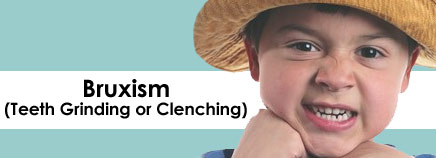Bruxism (Teeth Grinding) is the harsher sounds of gnashing and grinding teeth during sleep or clenching of jaws, which is common in kids.
Many kids have it (Approximately 20% to 30% will grind or clench.), but most outgrow it. Teeth grinding often happen During Deep Sleep phases or when kids are under stress.

Causes of Teeth Grinding
Why Teeth Grinding happens, the reason is not always sure.
In some cases, kids may grind because the teeth aren’t aligned properly. Some Children grind teeth as a response to pain, such as from an earache or teething. Children might grind their teeth as a way to ease the pain. Many kids outgrow this problem of teeth grinding.
Sometimes Stress — usually nervousness tension or anger — is another cause. Like a child might be worried about a test at school or a change in routine (a new sibling or a new teacher). Even some arguments with parents and siblings can cause enough stress to prompt teeth grinding.
Some hyperactive kids also have Bruxism. And sometimes children with underlying medical conditions (such as cerebral palsy) or who are taking some medicines can develop teeth grinding as a side effect of that medicine.
Effects of Teeth Grinding
Many cases of Teeth Grinding go undetected with not much problem, while for some children it causes headache or earache. Usually, it’s more disturbing for other family members.
In some children, teeth grinding and clenching can damage tooth enamel, chip teeth, increases temperature sensitivity, and cause facial pain and jaw problems, such as temporomandibular joint disease (TMJ). Most children who grind teeth, however, don’t have TMJ problems unless their grinding and clenching happen a lot.
Diagnosis of Bruxism
Most children who grind their teeth aren’t even aware of it, so mostly it’s siblings or parents who identify the problem.
Some signs to watch for:
- Grinding sound when your child is sleeping
- Child Complaints of a pain jaw or face after waking up in the morning
- Pain while chewing
Parents should visit the doctor if there is excessive grinding of teeth to look for damaged enamel and unusual wear and tear, check for unusual sensitivity.
If the damage is found, the doctor may ask your child a few questions, such as:
- How do you feel before bed?
- Is there any stress at home or at school?
- Are you angry with someone?
- What do you do before bed?
The examination will help to find out the cause like malalignment of teeth or stress and helps in planning effective treatment.
Treatment of Teeth Grinding
Most kids outgrow this problem; sometimes Dentist opinion is required,
In cases where the grinding and clenching causes pain in a child’s jaw or face or damages the teeth, dentists may advise a special night guard, which is similar to the protective mouthpieces worn by athletes.
Helping Kids with Bruxism
Whether the cause is physical or psychological, kids might be able to control teeth grinding by relaxing before bedtime — for example, by taking a warm bath or shower, listening to a few minutes of story, music, or reading a book.
Where Teeth grinding is caused by some sort of stress, ask about what’s upsetting your child and find a way to help.
If the problem is more complex, like shifting to a new place, discuss your child’s concerns and try to ease any fears. If you’re concerned, talk to your doctor.
In rare cases, further evaluation is required. This can help find the cause of the stress and a proper course of treatment.
How Long Does Teeth Grinding Last?
Most children overcome this problem when they lose their baby teeth. However, a few children continue to grind into adolescence. And if it is caused by stress, it will continue until the cause of stress is corrected.
Preventing Bruxism
Because most cases of Teeth Grinding are a child’s natural reaction to growth and development, most cases can’t be prevented. Stress-induced bruxism can be avoided, though. So talk with kids regularly about their feelings and help them deal with stress. Taking kids for routine dental visits can help find and treat Bruxism.
If you need any further information, you can comment below or call Motherhood Chaitanya Hospital at 0172-5088088.
